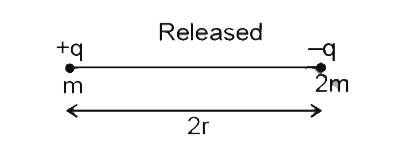The gravitational force between two objects is proportional to 1/R (and not as 1/R2) where R is separation between them, then a particle in circular orbit under such a force would have its orbital speed v proportional to
R
R0 (independent of R)
1R2
1R
The correct Answer is:B
Step by step video, text & image solution for The gravitational force between two objects is proportional to 1//R (and not as 1//R^(2)) where R is separation between them, then a particle in circular orbit under such a force would have its orbital speed v proportional to by Physics experts to help you in doubts & scoring excellent marks in Class 12 exams.
Updated on:21/07/2023Topper's Solved these Questions
- GRAVITATION BOOK - AAKASH INSTITUTECHAPTER - GRAVITATION EXERCISE - ASSIGNMENT SECTION - D (ASSERTION-REASON TYPE QUESTIONS)
16 Videos
- GRAVITATION BOOK - AAKASH INSTITUTECHAPTER - GRAVITATION EXERCISE - ASSIGNMENT SECTION - B (OBJECTIVE TYPE QUESTIONS)
26 Videos
- ELECTROSTATIC POTENTIAL AND CAPACITANCE BOOK - AAKASH INSTITUTECHAPTER - ELECTROSTATIC POTENTIAL AND CAPACITANCE EXERCISE - ASSIGNMENT SECTION - D
13 Videos
- KINETIC THEORYBOOK - AAKASH INSTITUTECHAPTER - KINETIC THEORYEXERCISE - EXERCISE (ASSIGNMENT) SECTION - D Assertion - Reason Type Questions
10 Videos
Similar Questions
Knowledge Check
If the gravitational force between two objects were proportional to 1/R (and not as 1/R2), where R is the distance between them, then a particle in a circular path (under such a force) would have its orbital speed v, proportional to
Aremains unchangedBR0 (independent of R)C1/R2D1/RIf the gravitational force were potential to 1r, then a particle in a circular orbit under such a force would have its original speed:
AIndepdent of rB∝1rC∝1r2D∝r2Suppose that the gravitational force between two bodies separated by a distance R becomes inversely proportional to R (and not as 1R2 as given by Newton's law of gravitation). Then the speed of a particle moving in a circular orbit of radius R under such a force would be proportional to
A1R2BR0CRD1R
Find out speed of particles when separation between them is r.

View SolutionThe gravitational force between two particles separated by a distance r varies as ……………
View SolutionThe gravitational force between two particles separated by a distance r varies as ……………
View SolutionThe gravitational force between two object is F. It masses of both object are halved without changing distance between them, then the gravitation force would become
View SolutionThe force between two electrons separated by a distance r is proportional to
View Solution
